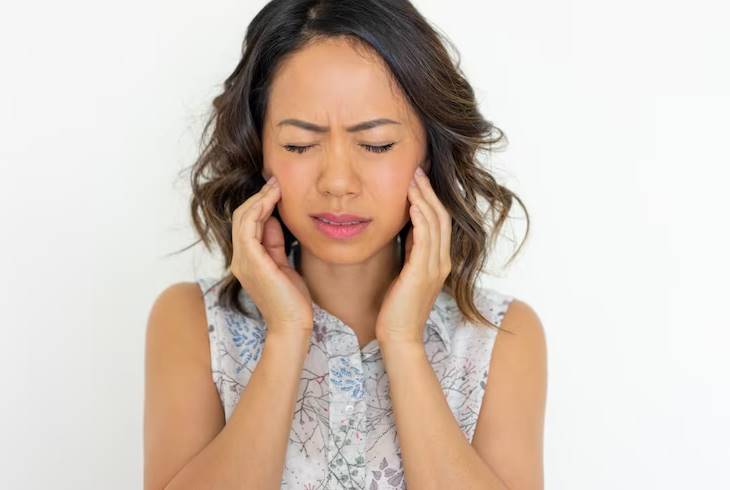Have you ever experienced a headache that seems to be radiating from your jaw? Or maybe you’ve noticed feeling unusually tired and struggling with constant fatigue, especially in the context of experiencing frequent headaches.
Most people may not realize it, but there is a heightened connection between jaw pain, headaches, and fatigue. In this article, we will take a deeper dive into the causes of these conditions, and how we can manage them effectively.
What is TMJ and Why Does It Cause Headaches?
The temporomandibular joint (TMJ) or jaw joint, is the joint that connects the temporal bone of the skull to the lower jawbone (mandible). The TMJ is responsible for facilitating jaw movement, such as opening and closing the mouth, chewing, talking and yawning. When you experience pain in these areas, it may be a sign of TMJ disorder.

The TMJ disorder can lead to tension headaches since the precise location of the TMJ is directly behind the eyes and ears. This tension can trigger headaches which are usually felt around the forehead and temples. To manage TMJ pain, a combination of pain medication, relaxation techniques and physical therapy can be helpful.
How Fatigue can be Linked to Headaches
Headaches may not seem like they are energy-intensive, but they can cause body fatigue. Headaches can lead to reduced physical activity and less restful sleep, leading to a feeling of tiredness and exhaustion.
A common cause of headaches that are linked to fatigue is migraines. Migraines can cause debilitating attacks that can last for hours, resulting in both physical and mental exhaustion. If you struggle with frequent migraines, it is crucial to speak with a doctor to explore more definitive management options.
The Role of Stress in Jaw Pain
Stress is a major cause of TMJ disorder and may cause jaw pain. Stress causes people to clench their jaws, which can lead to TMJ disorder over time. Most people who experience stress during work hours find themselves clenching their teeth unknowingly.
Jaw clenching may compress the jaw joint and the soft disc in front of it that can lead to headaches and jaw pain. Deep breathing, avoiding caffeine and alcohol, and regular exercise are some of the effective stress-relief techniques that can help alleviate TMJ disorder caused by stress.
Sleep Apnea and Fatigue
Sleep apnea occurs when there are short pauses in breathing during sleep that may occur up to hundreds of times per night, leading to poor quality sleep. Sleep apnea leads to fatigue, and prior research has shown links between sleep apnea and other health problems including hypertension and diabetes.
When patients develop sleep apnea, their bodies are not getting the proper rest they need from deep REM sleep, which may lead to headaches and body fatigue. Using special breathing aids such as a CPAP (continuous positive air pressure) machine can help manage sleep apnea and, in turn, fatigue, as well as headaches.
Managing Headache, Jaw Pain, and Fatigue
Treatment plans may vary depending on the conditions diagnosed, but there are universal self-care techniques that all patients can utilize to help manage their symptoms.
These include:
- Applying ice packs to areas of discomfort
- Avoiding foods that may trigger headaches or exacerbate TMJ disorder
- Choosing soft foods that are easy to chew and avoiding gum
- Using a mouthguard while sleeping to reduce the pressure caused by clenching/grinding teeth
- Using relaxation techniques such as meditation or yoga, and seeking help for anxiety or stress-related conditions if necessary
Conclusion
Jaw pain, headaches, and fatigue may seem like separate medical conditions, but they are all interlinked. There is a lot of research that has identified these relationships, and it is important to seek medical advice if you suffer from any of these conditions. Self-care measures, such as avoiding caffeine and alcohol, applying ice packs, and using safe pain medication are useful for managing symptoms. For more definitive management, consult with your doctor or a TMJ specialist to explore other treatment options, such as physical therapy or oral appliances. With proper management, headaches, jaw pain, and fatigue can all be reduced and managed effectively. So take care of yourself so that you can continue living a happy and healthy life.
FAQs – Headache, Jaw Pain, and Fatigue
1. What are the common causes of headache, jaw pain, and fatigue?
Headache, jaw pain, and fatigue can be caused by various factors, including stress, tension, poor posture, teeth grinding (bruxism), temporomandibular joint (TMJ) disorders, sinus infections, dehydration, and sleep disorders like sleep apnea.
2. When should I consult a doctor for headache, jaw pain, and fatigue?
You should consult a doctor if your symptoms are persistent, worsen over time, or are accompanied by other concerning signs such as fever, vision changes, severe neck stiffness, or difficulty speaking. Additionally, seek medical attention if your symptoms don’t improve with self-care measures or over-the-counter pain relievers.
3. How can I alleviate headache, jaw pain, and fatigue at home?
Some home remedies include applying ice or heat packs to the affected area, practicing relaxation techniques like deep breathing or meditation, maintaining proper posture, staying well-hydrated, and taking over-the-counter pain relievers as directed. It’s also important to ensure you’re getting enough sleep and managing stress levels.
4. Can my diet and lifestyle choices affect my headache, jaw pain, and fatigue?
Yes, certain dietary and lifestyle choices can contribute to these symptoms. Consuming excessive amounts of caffeine or alcohol, smoking, and eating foods high in nitrates or MSG can trigger headaches. Maintaining a healthy diet, exercising regularly, and avoiding known triggers may help reduce the frequency and intensity of your symptoms.
5. Are there any long-term complications associated with headache, jaw pain, and fatigue?
In some cases, untreated or poorly managed symptoms may lead to chronic pain, sleep disturbances, and a decreased quality of life. It’s essential to address the underlying causes and work with your healthcare provider to develop an appropriate treatment plan to prevent potential complications.
6. What treatment options are available for headache, jaw pain, and fatigue?
Treatment options depend on the underlying cause of your symptoms. In some cases, over-the-counter pain relievers, physical therapy, or relaxation techniques may be sufficient. For more severe or persistent cases, your healthcare provider may recommend prescription medications, dental appliances (for bruxism or TMJ disorders), or other specialized treatments. Additionally, addressing any underlying sleep or mental health issues can also help alleviate symptoms.


















